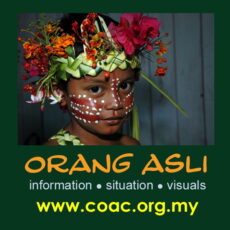BOULDERS IN THE RIVER
Colin Nicholas
Published in A Special Place, Badan Warisan Malaysia, 2007, p. 20.
One of the earliest Orang Asli communities I have lived with and whom I got to know intimately over the years were the Semai who claimed the middle reaches of the Telom and Woh Rivers as their ancestral lands.
This valley, in the shadow of Gunung Batu Putih in the Tapah Hills of Perak, is a place rich with natural beauty and steeped in history. Here the Orang Asli still revere the environment, being aware of its powers and appreciative of its bounty.
Here also was where the small team of British ‘stay-behind’ soldiers and the communist insurgents conducted their guerilla warfare against the Japanese during World War II. The Semai can still identify the famous campsites mentioned in Spencer Chapman’s The Jungle is Neutral and the routes of the numerous treks they took (with the Semai’s help).
I have been visiting this place since the mid-1980s and never fail to be continually impressed with the endless number of legends they tell that are associated with specific places or physical features: how an old man’s anger at some noisy children turned himself into a stone elephant, or how the giant, Bah Lujh, caused the huge boulders to be placed in the Woh River, and many more.
Not surprisingly, therefore, the Semai here do not only depend materially on this particular ecological niche; they also share a spiritual relationship with it. Their history and identity are also contained in this geographical space, which in turn assures their viability as an independent and dignified people.
Fortunately, the place has not changed much over the years. The various attempts to log its rich timber have failed mainly because these two rivers provide water for the townsfolk in Tapah.
But the area should be protected, permanently, as part of a bigger Titiwangsa Heritage Forests area in the central mountain range. It should become a heritage site that reflects the maturity of our era – where the need to keep for future generations take precedence over greed, where elements of our past are not discarded or forgotten, and where our present derives pride and identity in what we uniquely have.

